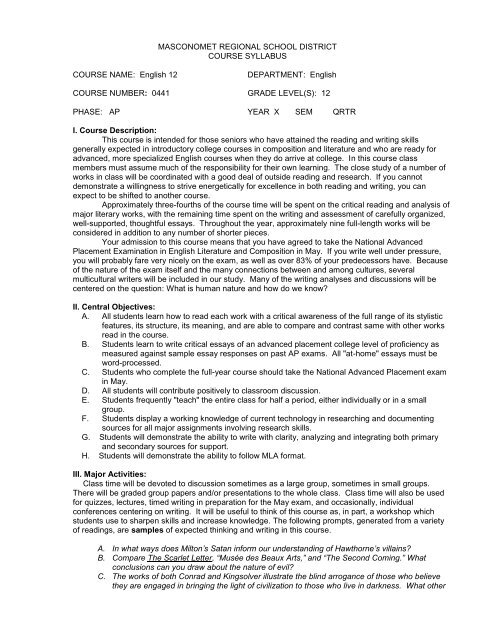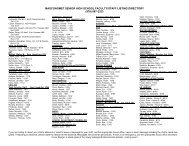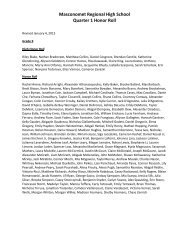CG-HS-AP-12-2011 - Masconomet Regional School District
CG-HS-AP-12-2011 - Masconomet Regional School District
CG-HS-AP-12-2011 - Masconomet Regional School District
You also want an ePaper? Increase the reach of your titles
YUMPU automatically turns print PDFs into web optimized ePapers that Google loves.
MASCONOMET REGIONAL SCHOOL DISTRICT<br />
COURSE SYLLABUS<br />
COURSE NAME: English <strong>12</strong> DEPARTMENT: English<br />
COURSE NUMBER: 0441 GRADE LEVEL(S): <strong>12</strong><br />
PHASE: <strong>AP</strong> YEAR X SEM QRTR<br />
I. Course Description:<br />
This course is intended for those seniors who have attained the reading and writing skills<br />
generally expected in introductory college courses in composition and literature and who are ready for<br />
advanced, more specialized English courses when they do arrive at college. In this course class<br />
members must assume much of the responsibility for their own learning. The close study of a number of<br />
works in class will be coordinated with a good deal of outside reading and research. If you cannot<br />
demonstrate a willingness to strive energetically for excellence in both reading and writing, you can<br />
expect to be shifted to another course.<br />
Approximately three-fourths of the course time will be spent on the critical reading and analysis of<br />
major literary works, with the remaining time spent on the writing and assessment of carefully organized,<br />
well-supported, thoughtful essays. Throughout the year, approximately nine full-length works will be<br />
considered in addition to any number of shorter pieces.<br />
Your admission to this course means that you have agreed to take the National Advanced<br />
Placement Examination in English Literature and Composition in May. If you write well under pressure,<br />
you will probably fare very nicely on the exam, as well as over 83% of your predecessors have. Because<br />
of the nature of the exam itself and the many connections between and among cultures, several<br />
multicultural writers will be included in our study. Many of the writing analyses and discussions will be<br />
centered on the question: What is human nature and how do we know?<br />
II. Central Objectives:<br />
A. All students learn how to read each work with a critical awareness of the full range of its stylistic<br />
features, its structure, its meaning, and are able to compare and contrast same with other works<br />
read in the course.<br />
B. Students learn to write critical essays of an advanced placement college level of proficiency as<br />
measured against sample essay responses on past <strong>AP</strong> exams. All "at-home" essays must be<br />
word-processed.<br />
C. Students who complete the full-year course should take the National Advanced Placement exam<br />
in May.<br />
D. All students will contribute positively to classroom discussion.<br />
E. Students frequently "teach" the entire class for half a period, either individually or in a small<br />
group.<br />
F. Students display a working knowledge of current technology in researching and documenting<br />
sources for all major assignments involving research skills.<br />
G. Students will demonstrate the ability to write with clarity, analyzing and integrating both primary<br />
and secondary sources for support.<br />
H. Students will demonstrate the ability to follow MLA format.<br />
III. Major Activities:<br />
Class time will be devoted to discussion sometimes as a large group, sometimes in small groups.<br />
There will be graded group papers and/or presentations to the whole class. Class time will also be used<br />
for quizzes, lectures, timed writing in preparation for the May exam, and occasionally, individual<br />
conferences centering on writing. It will be useful to think of this course as, in part, a workshop which<br />
students use to sharpen skills and increase knowledge. The following prompts, generated from a variety<br />
of readings, are samples of expected thinking and writing in this course.<br />
A. In what ways does Milton’s Satan inform our understanding of Hawthorne’s villains?<br />
B. Compare The Scarlet Letter, “Musée des Beaux Arts,” and “The Second Coming.” What<br />
conclusions can you draw about the nature of evil?<br />
C. The works of both Conrad and Kingsolver illustrate the blind arrogance of those who believe<br />
they are engaged in bringing the light of civilization to those who live in darkness. What other
traits do Nathan Price and Mr. Kurtz share? What conclusions can you draw?<br />
D. In “Shooting an Elephant” Orwell shows how holding a position of power reduces his<br />
autonomy. Does a similar dynamic play out in Hamlet or “Heart of Darkness?” Explain.<br />
E. In The End of Faith: Religion, Terror, and the Future of Reason, Sam Harris explains that<br />
delusional beliefs become normal if enough people share them. He states, “Clearly, there is<br />
sanity in numbers.” Consider “The Yellow Wallpaper,” “The Story of an Hour,” and One Flew<br />
Over the Cuckoo’s Nest. Does the Harris quote illuminate those works? If so, what<br />
conclusions can you draw about madness and sanity?<br />
F. In what ways does Bertha/Antoinette serve as a double or alter ego for Jane? Support your<br />
analysis with references to Jane Eyre and Wide Sargasso Sea. How are mad women depicted<br />
in each novel?<br />
G. According to Helen Tiffin, “cultural marginality divides the psyche, makes it Other to itself, and<br />
permits no unified—even if illusory—sense of Self.” Apply this statement to Antoinette of Wide<br />
Sargasso Sea and Chief Bromden of One Flew Over the Cuckoo’s Nest.<br />
H. Compare the “blessed rage for order” in Wallace Stevens’ “Idea of Order at Key West” with<br />
Hamlet’s urgent desire for certainty about the death of his father. How are the two similar?<br />
How different? What conclusions can you draw?<br />
I. What is the relationship between poetry, the poet, and the reality of his world? Compare<br />
Whitman’s Preface and poems by Stevens, Keats, and Yeats.<br />
IV. General Expectations:<br />
You are in this class because you chose to be. Given that fact, we expect that you are also ready<br />
to work. That means that you will do the reading and write the assignments. That means that you will<br />
come to class having thought about what you have read. Students who are unwilling to put forth their<br />
best effort will certainly not receive A’s and will be shifted summarily to a College Preparatory section.<br />
This is the last English course you will have in high school. It is meant as direct preparation for<br />
college. A large part of success in college – perhaps the major part – entails a willingness to work hard.<br />
If you are unwilling to put forth a genuine effort, then you are misplaced.<br />
V. Evaluation:<br />
Approximate grading breakdown:<br />
Essays, tests, projects: 60%<br />
Reading responses, quizzes: 30%<br />
Contributions to class dialogue: 10%<br />
Total: 100%<br />
VI. Text/Materials:<br />
We will read a good variety of authors. They may include, but may not be limited to the following:<br />
Chaucer, Milton, Shakespeare, Donne, Pope, Swift, Wordsworth, Keats, Shelley, Conrad, Joyce, Dickens,<br />
Lawrence, Woolf, Forster, Larkin, Bronte, Hardy, Allende, Austen, Walker, Kingsolver, Hawthorne,<br />
Wharton, James, Austen, Heller, Rhys, Kesey, Hardy, Yeats, Stevens, Eliot, Plath, and Faulkner. What<br />
we read is less important than that we read well.<br />
VII. Scope and Sequence:<br />
Because of school activities, college applications, weather, holidays, pet crises, and other<br />
unforeseen disasters, it is impossible to assign dates to specific tasks. Expect to be busy. By the time<br />
we get to May, those of you who remain will be well prepared to put in an exemplary performance on the<br />
<strong>AP</strong> examination. And if you can bring yourself up to that standard, by the time you reach The College of<br />
Your Choice in one short year, you can expect to compete with anyone – at least in this sport.<br />
Revised 6/11




